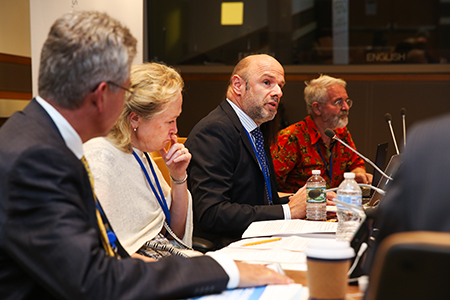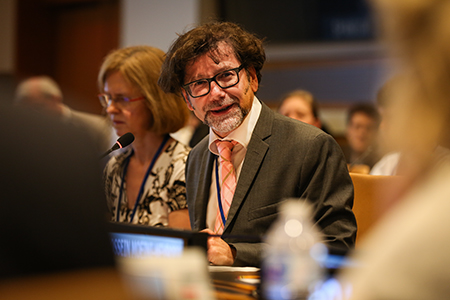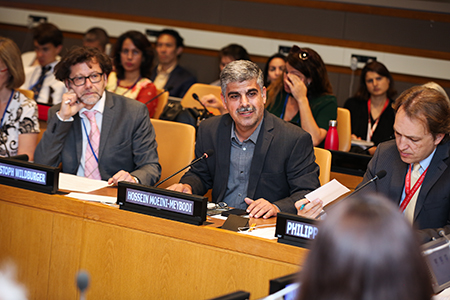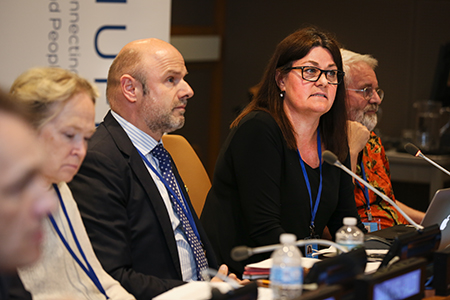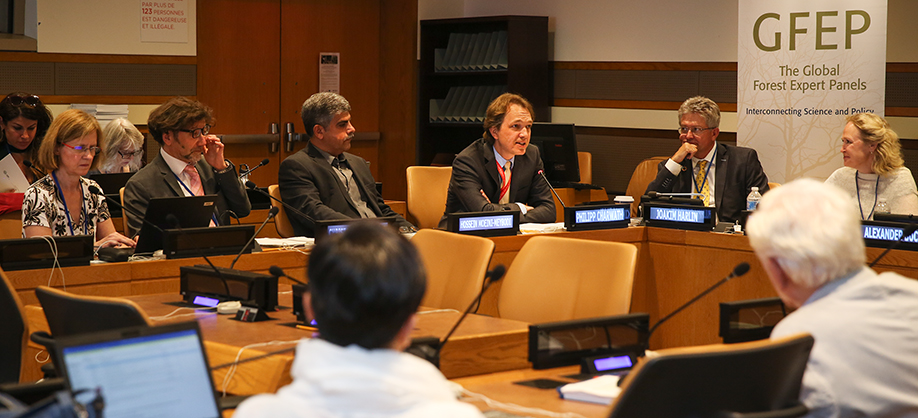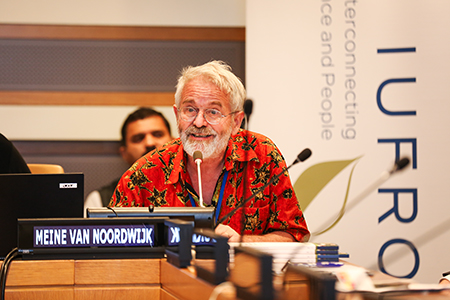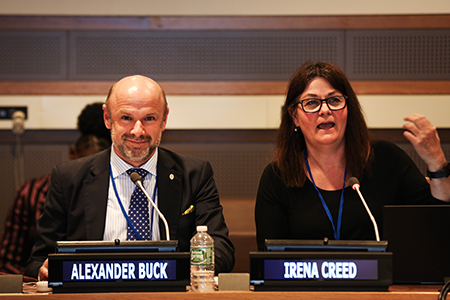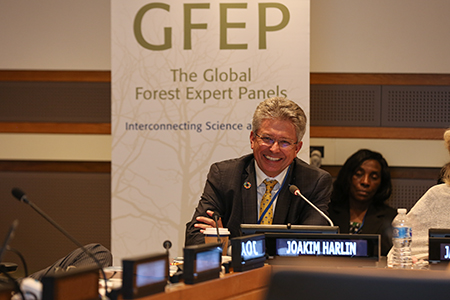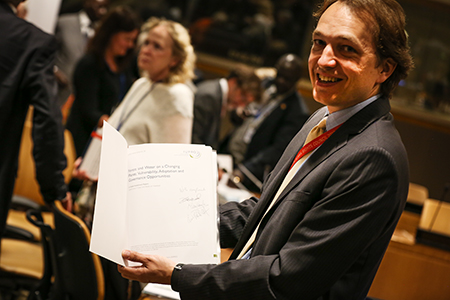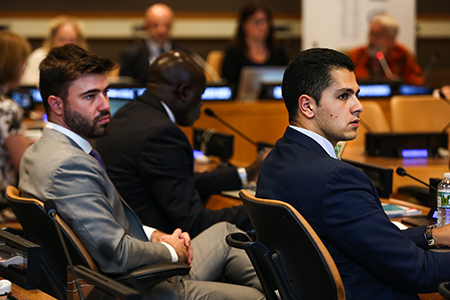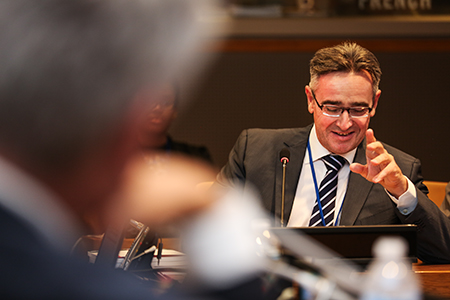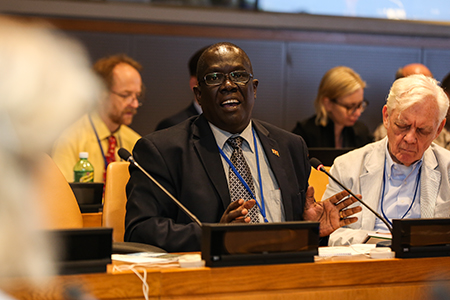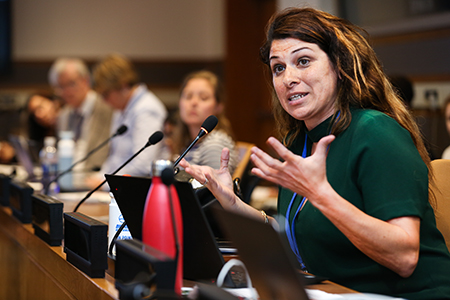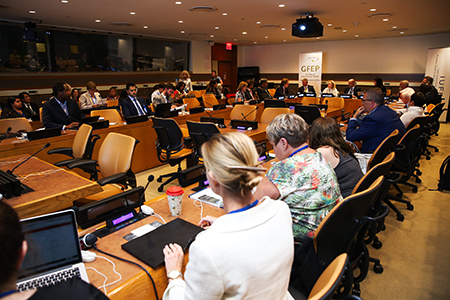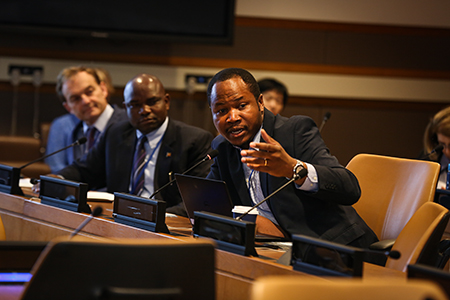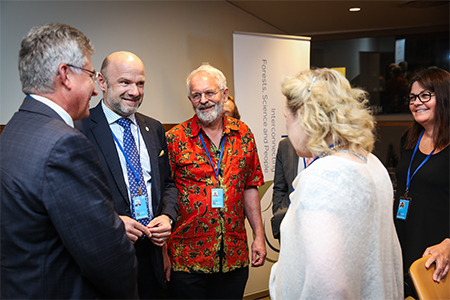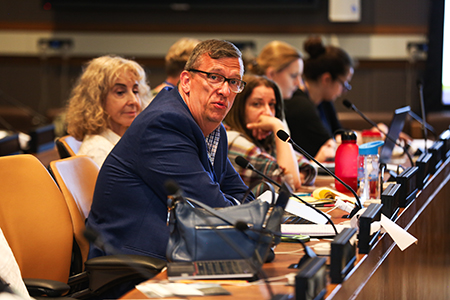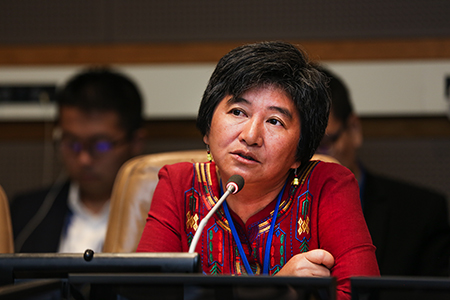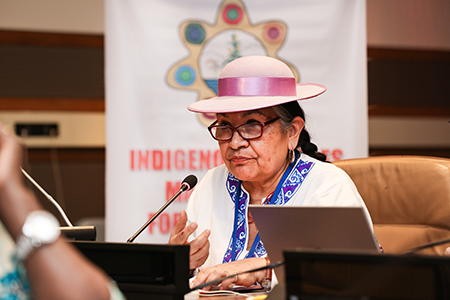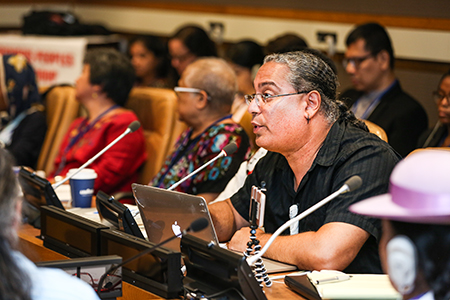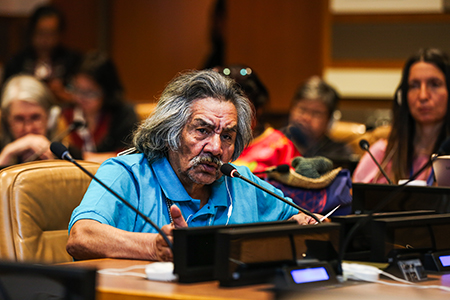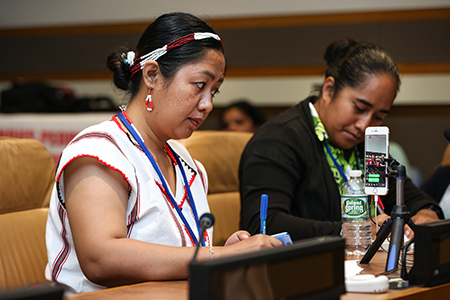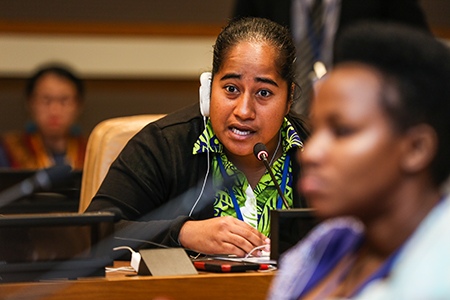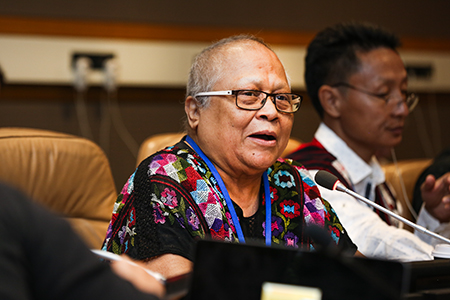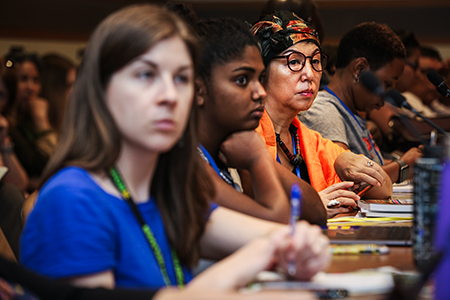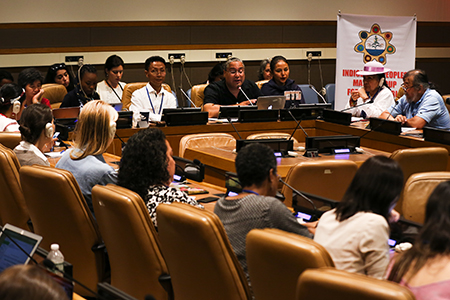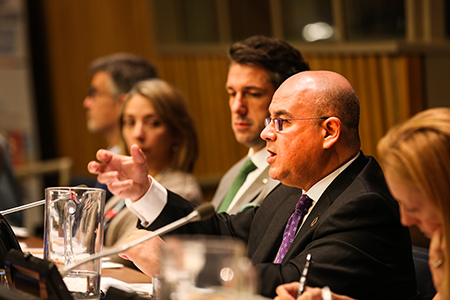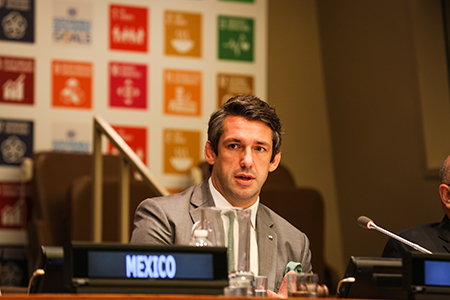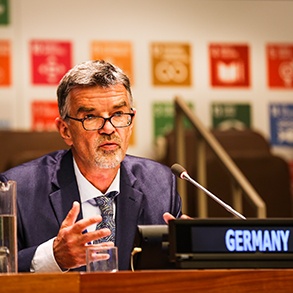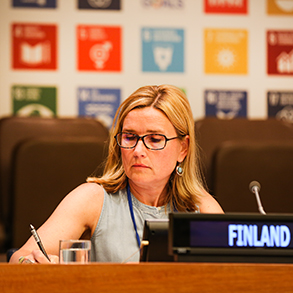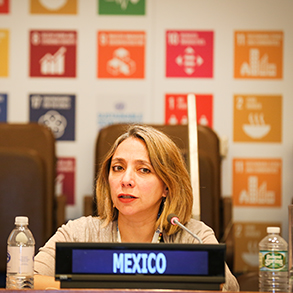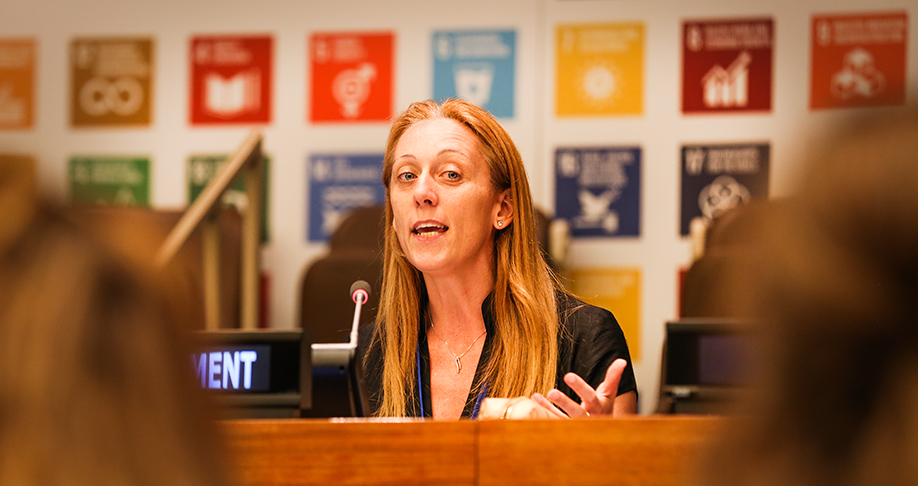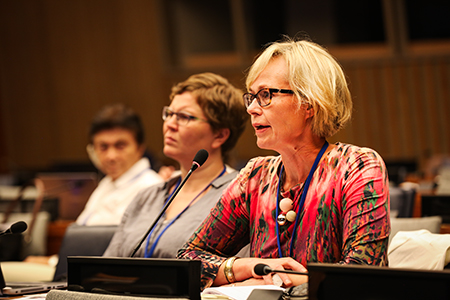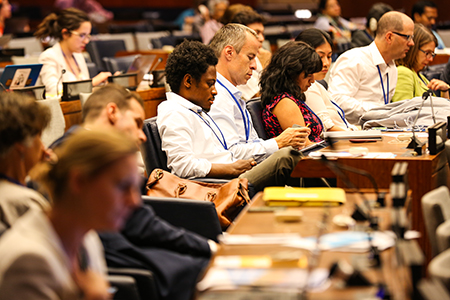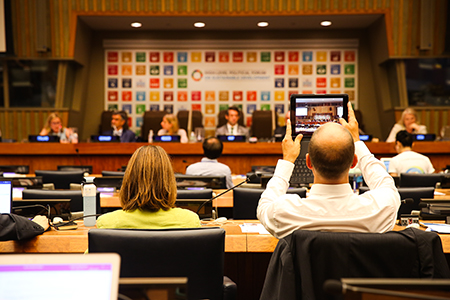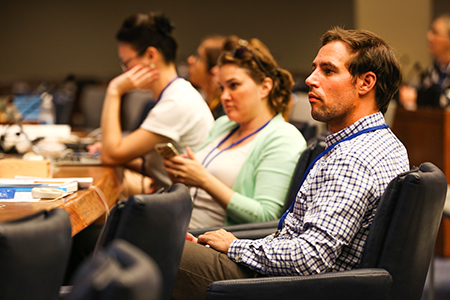Summary
The following events were covered by IISD Reporting Services on Tuesday, 10 July, 2018:
- Forests and Water on a Changing Planet: Scientific Insights for Building Sustainable and Resilient Societies
- Status of Lands, Territories and Resources of Indigenous Peoples and Sustainable Development
- Implementing SDG 12: One Plan for One Planet
Photos by IISD/ENB | Natalia Mroz
For photo reprint permissions, please follow instructions at our Attribution Regulations for Meeting Photo Usage Page
Forests and Water on a Changing Planet:
Scientific Insights for Building Sustainable and Resilient SocietiesPresented by Permanent Mission of Austria to the UN and International Union of Forest Research Organizations (IUFRO)
This event was convened to provide guidance to the HLPF on the linkages between Sustainable Development Goal 15 (SDG15) on forests and other SDGs and to launch the global assessment report, “Forest and Water on a Changing Planet: Vulnerability, Adaptation and Governance Opportunities,” by the Global Forest Expert Panel (GFEP) on forests and water (GFEP report).
Moderator Alexander Buck, Executive Director, IUFRO, opened the event, noting that all life depends on water and that an estimated three quartersof the world’s supply comes from forested watersheds.
Philipp Charwath, Deputy Permanent Representative of Austria to the UN, underscored the importance of forests and water to his country, highlighted the interlinkages of forest ecosystems to SDGs, and hoped the outcomes of the GFEP report would have an impact on the 2030 Agenda for Sustainable Development.
Hossein Moeini-Meybodi, UN Forum on Forests (UNFF) - UN Department of Economic and Social Affairs (UN DESA), emphasized connecting science to policy making. He observed that few of the interventions on water during the previous day’s HLPF session mentioned the link between forests and water conservation, and said the forest-water link needed to be highlighted so policy makers can make sound decisions.
Christoph Wildburger, GFEP and IUFRO, said that as the world population grows, the demand for water rises, and while the world has mobilized around the SDGs, which all linked to water, more attention is needed to highlight the forest-water connection. He explained that the GFEP report is about the climate-forest-water-people nexus.
GFEP Co-chair Meine van Noordwijk, World Agroforestry Centre (ICRAF) and Wageningen University, said the GFEP report was intended to inform relevant international policy processes, especially discussions on SDGs. He highlighted use of a risk management tool to structure the analysis and explained that the report focused on addressing three questions: do forests matter; who is responsible and what should be done: and how can be progress be made and measured. He said the forest has a role in modifying rainfall and climate in a way that is not captured under the UN Framework Convention on Climate Change. He noted that scientific gaps still exist for creating an overarching policy and outlined different perspectives on the forest-water connection, including: no forest-no water/more forest-more water; more forest-less water; and, it depends. He hoped to see more recognition of the connections between forest, water and climate, perhaps through the SDG portfolio.
GFEP Co-chair Irena Creed, University of Saskatchewan, described the GFEP report’s key conclusions and insights, including:
- Forest-water ecosystem services are important for society;
- Water is central to all 17 SDGs;
- Climate, forests, water and people are inextricably inter-connected and, despite this complexity, they must be managed as a system;
- National governments should work together on global water governance;
- Managing forests for water requires the right kind of forest (or tree), at the right place and at the right time;
- New institutional and governance frameworks can play a key role in optimizing climate-forest-water management;
- National governments must focus on the role of forests for water (and water for forests), not just forests for carbon; and
- Outstanding knowledge gaps on the forest-water interactions within the climate-forest-water-people system must urgently be tackled.
Jaana Husu-Kallio, Permanent Secretary, Ministry of Agriculture and Forestry, Finland, emphasized the need to move from silo-type thinking, saying the biggest challenge is to reorganize and think from the nexus point of view. He said Finland’s development policy “One world, common future” takes forests and water into account.
Joakim Harlin, UN Environment and Vice-Chair, UN-Water, stressed integrated water and land management and noted links between SDG6 and SDG15, including SDG6 Target 6.6 (protect and restore water-related ecosystems) and Indicator 6.6.1 and its connection to forest and mountain ecosystems. He urged participants to carry forward as a key message the links between the two SDGs.
During the ensuing discussion, topics included: lack of reference to water during HLPF interventions on SDG15; the need for a multi-sectoral and multi-disciplinary approach; inadequate training in hydrology in many countries; engagement of the private sector; the role of food security; and the possibility of developing a synthesis report that combines SDG6 and SDG15 for the next HLPF to provide informed policy advice.
The event concluded with the formal launch of the GFEP report, which is available online at:
http://www.iufro.org/science/gfep/forests-and-water-panel/report/
Moderator Alexander Buck, IUFRO, opens the side event on forests and water
Christoph Wildburger said the establishment of scientific panels, assessments, reports and policy briefs help support informed decision making
Hossein Moeini-Meybodi UNFF – UNDESA, said the forest and water connection is key to ensuring the SDGs are achieved by 2030
Irena Creed, University of Saskatchewan, said we arere altering the way forests transmit water downstream and recycle water downwind
Philipp Charwath, Deputy Permanent Representative of Austria to the UN, described forests as fundamental elements of Austria’s “national psyche”
Meine van Noordwijk, World Agroforestry Centre (ICRAF) and Wageningen University
Alexander Buck and Irena Creed
Joakim Harlin, UN Environment and UN-Water, noted it’s not always clear whether forests and water are “friends or foes”
Philipp Charwath, Austria, holds a signed copy of the newly released report, “Forest and Water on a Changing Planet: Vulnerability, Adaptation and Governance Opportunities” by GFEP
Panelists and participants engage during and after the discussion session
Contact:
- Christoph Wildburger
| wildburger@iufro.org
More Information:
Status of Lands, Territories and Resources of Indigenous Peoples and Sustainable DevelopmentPresented by the Indigenous Peoples Major Group for Sustainable Development (IPMG)
Moderator, Roberto Borrero, IPMG, noted the critical role of securing the lands, territories and resources of indigenous peoples to achieve the SDGs.
Hindou Oumarou Ibrahim, Association des Femmes Peules Autochtones du Tchad (AFPAT), Africa, presented on the African Union Agenda 2063, which aims to ensure: inclusive growth and sustainable development; a politically united and integrated continent; and good governance and respect for human rights. She called for Agenda 2063 to recognize indigenous peoples’ rights to land, territories, and resources.
Gam Shimray, Asia Indigenous Peoples Pact (AIPP), Asia, said that countries in Asia, including the Philippines, India, Indonesia, Malaysia, and Japan, have legal recognition of indigenous peoples’ land and territorial rights, but that enforcement remain inadequate. She noted the importance of “community champions” to mobilize to protect their lands and territories.
Pavel Sulyandziga, International Development Fund of Indigenous Peoples, Russia, highlighted the successful creation of the Bikin National Park, which is co-managed by indigenous peoples and the Government of the Russian Federation.
Janene Yazzie (Diné), entrepreneur and human rights advocate, North America, outlined threats to indigenous peoples in the Americas, such as: lack of access to and protection of sacred sites and landscapes; criminalization of land rights and human rights’ defenders; and lack of access to international funding to support sustainable development and climate change mitigation. She called for full implementation of the UN Declaration on the Rights of Indigenous Peoples (UNDRIP) to achieve the SDGs.
Myrna Cunningham Kain, El Fondo para el Desarrollo de los Pueblos Indígenas de América Latina y El Caribe (FILAC), Latin America, noted that more than 900 conflicts on control over indigenous peoples’ lands are ongoing in Latin America. She stressed the importance of local and national governments for establishing a legal procedure to allow rapid demarcation and official recognition of indigenous peoples’ property rights to lands and natural resources.
Joan Carling, IPMG, Global, noting that land and territorial rights are fundamental rights of indigenous peoples, stressed the need to include securing protection of the planet and marginalized groups into SDG discussions. She called for full participation of indigenous peoples in national SDG decision making and review.
Tarcila Rivera Zea, Centre for Indigenous Cultures of Peru (CHIRAPAQ) and UN Permanent Forum on Indigenous Issues (PFII), Women, highlighted that climate change affects the production of crops and food security of indigenous peoples, but that that indigenous women cope with climate change sustainably by using organic insecticides, natural fertilizers, and resilient seeds. She noted the importance of including indigenous women’s knowledge in measures addressing climate change.
Sylvia Elias, Global Indigenous Youth Caucus, Youth, noted that a partnership with UN Food and Agriculture Organization enabled increasing capacity of youth to represent themselves in various SDG platforms, and called for international support to recognize unrepresented indigenous youth groups, including those in small island countries.
During the ensuing discussion, participants commented on: the need for indigenous peoples to have stronger voice for closing gaps between legal recognition of indigenous peoples’ land rights and practical implementation; ensuring indigenous peoples’ participation in national SDG consultations, including approaching New York City-based delegates to have more dialogue; and linking the issue of refugees and displacement with land and territorial rights of indigenous peoples.
Joan Carling, IPMG, Global, said the business-as-usual approach to implementing SDGs poses serious threats to indigenous peoples
Tarcila Rivera Zea, CHIRAPAQ and UN PFII Women, said structural racism must be eradicated in the context of SDGs
Roberto Borrero, IPMG, called for greater focus on enhancing the resilience of indigenous peoples’ land, territories, and resources
Carlos Edén Maidel, Terra del Fuego, Chile, called for collective actions to protect indigenous peoples in Latin America who suffer from oppression, exploitation, and human rights abuses
The room during the side event
A participant taking notes during the event
A participant during the event
Sylvia Elias, Global Indigenous Youth Caucus, Youth, noted the importance of continued efforts to mobilize youth for securing indigenous people’s land and natural resources
Myrna Cunningham Kain, El Fondo para el Desarrollo de los Pueblos Indígenas de América Latina y El Caribe (FILAC), Latin America, said what is missing is legal recognition to make the rights a reality
Participants during the event
Participants during the event
Contact:
- Joan Carling
| joan@indigenouspeoples-sdg.org
More Information:
Implementing SDG 12: One Plan for One PlanetPresented by the board of the 10-Year Framework of Programmes on Sustainable Consumption and Production (10YFP)
The event was convened to provide inputs to the HLPF on accelerating SDG12 implementation and to launch the One Planet network’s new strategy “One Plan for One Planet.” Speakers presented the pillars of the strategy and provided practical cases and examples on how these can be taken forward.
Ulf Jaeckel, Chair, Board of 10YFP, and Federal Ministry for the Environment, Nature Conservation and Nuclear Safety, Germany, opened the event and noted that the One Planet network is an “implementing mechanism for SDG12,” which promotes effective coordination among and concrete solutions towards governments and non-government organizations. He said that the new 5-year Strategy 2018-2022, defines a common vision and objectives, strategic principles and approaches across the One Planet network.
Moderator, Annika Lindblom, Chair, Strategy Task Force for 10YFP, and Secretary General, National Commission on Sustainable Development, Ministry of the Environment, Finland, noted that the One Planet network, pursing a systemic approach through multi-stakeholder partnerships, developed the Strategy 2018-2022 through: comprehensive stocktaking with a dedicated task force; independent and external review on effectiveness of the network and implementation of 10YFP; and setting a common direction and visions for the Sustainable Consumption and Production (SCP) community. She outlined the Strategy’s four objectives: acting as an effective implementation mechanism for SDG12; catalyzing ambitious actions by providing tools and solutions that shift to SCP; leading systemic and cohesive implementation of SCP; and demonstrating the impacts of SCP and its role in addressing key environmental and social challenges. To address gaps in SDG12 implementation among other SDGs, the network’s multi-partner trust fund for SDG12 aims to collect assets across UN entities to accelerate actions.
Jaeckel reported on his country’s initiatives, including: a national program on sustainable consumption that includes over 170 concrete actions and measures, efforts to provide consumer information, standard setting, and participation in a sustainable public procurement program.
Elisa Tonda, UN Environment, said that tools related to sustainable consumption and production were developed by many partners long before the One Planet network, but that tools and methods created under the network’s umbrella promote innovative approaches, including working with the private sector, and count on the support of all partners. She emphasized the network’s coordinating and synergistic role for accelerating action on the ground.
Peter McFeely, World Wildlife Fund (WWF), outlined One Planet network’s local projects which focus on sustainable food systems, including: a hotel kitchen program promoting food-waste reduction through toolkits developed with the private sector in the US; supporting smallholder farmer producers to avoid pesticide use while protecting wildlife in Malaysia; reducing ivory consumption in China; and the Sustainable Diner program in the Philippines that shifts consumers choices to sustainable products. He called for integration across different geographic areas, sectors, stakeholders, and SDGs to scale up these actions.
Norma Munguia Aldaraca, Director General for Global Issues, Ministry of Foreign Affairs, Mexico, said SDGs cannot be achieved without involvement of the private sectors and civil society. She described Mexico’s National Council for 2030 Agenda, which oversees and guides the elaboration of future national development plans through multi-stakeholder consultations. Munguia Aldaraca noted that partnering with the One Planet network offers an opportunity for Mexico’s incoming administration to introduce an integrated SDG national action plan.
Fernando Hernandez, Head of Supplier Diversity & Sustainability, Microsoft, said investment sends a large signal, noting that for every $1million dollars Microsoft spends, 17 new jobs are created. He described positive impacts on education and training, such as a “full-inclusion” approach to hiring and contracting. He said his company is piggy-backing off the work of the One Planet network and sees this as a transformation time, noting the power of technology, such as Artificial Intelligence, to effect positive change in areas such as eradication of disease-carrying mosquitoes.
In conclusion, Birgitte Bryld, Division for Sustainable Development Goals, UN DESA, highlighted promoting SCP as an entry point for addressing SDGs and climate change to help deepen collaboration with other SDG-related initiatives. Moderator, Annika Lindblom, called for One Planet network projects to shift from implementation to generating impacts and scaling up through showcasing best practices and challenges.
During the ensuing discussion, topics included: the limited funding for SDG12; that sustainable production and consumption isn’t a direct goal, unlike protection of biodiversity or climate change; the need for relevant indicators; how animal protection fits into SCP and the potential for related labeling; public procurement as an important tool; the potential for increased farm efficiency; and the promotion of “green” businesses.
Fernando Hernandez, Microsoft, said our consumption choices affect whether we have a better or worse planet
Peter McFeely, WWF, said we are finally moving into implementation and scale up pragmatically
Panelists during the session
Ulf Jaeckel, Chair, Board of 10YFP, said the SCP community has a strategy for the next 5 years, enabling us to collectively deliver on SCP and SDG12
Moderator, Annika Lindblom, Chair, 10YFP Strategy Task Force, highlighted SCP as an enabler for implementing other goals and targets
Norma Munguia Aldaraca, Director-General for Global Issues, Ministry of Foreign Affairs, Mexico, said her country is working with the private sector to address interlinkages between SCP and fisheries, forestry, and tourism
Elisa Tonda, UN Environment, stressed the value of tools developed and owned by the entire One Planet network
A participant posing a question during the event
Participants during the event
Participant taking a picture during the event
Participants during the event
Contact:
- Sofie Clausen, One Planet Network, 10YFP Secretariat
| sofie.clausen@un.org
